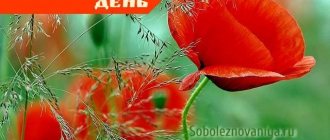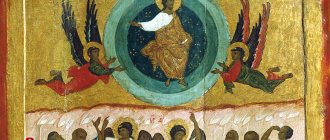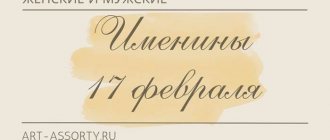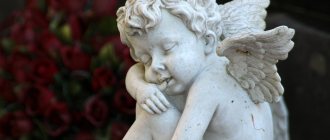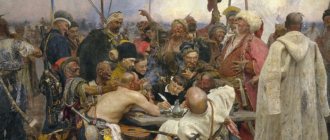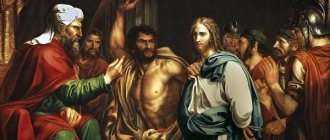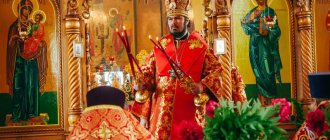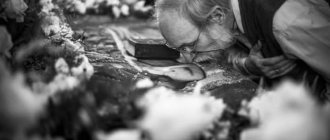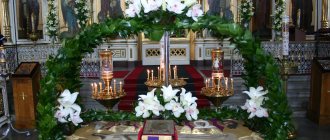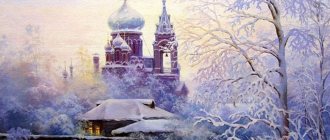St. Andrew's Day is an Orthodox holiday that is celebrated annually on December 13th. On this date, believers honor the memory of Saint Andrew, the brother of the Apostle Peter. He received his nickname “First Called” in honor of the fact that he once became the first follower of Jesus Christ and began to preach the Christian faith. In this article I will talk about how St. Andrew's Day appeared, about its traditions and signs.
On what date is the memory of the Apostle Andrew the First-Called celebrated?
The Day of St. Andrew the First-Called is celebrated in the Orthodox Church on December 13 (November 30, old style). The saint is also commemorated together with the other apostles on July 13 (June 30, old style).
This saint has been revered in Rus' since ancient times. After all, it was he, according to Tradition, who was the first to bring the news of Christianity to Russian soil. Patriarch Kirill of Moscow and All Rus' said the following in his sermon on July 11, 2013:
“Apostle Andrew was considered the patron saint of all Rus'. And it is no coincidence that the Romanov dynasty, in the person of Emperor Peter I, chose the apostle as its patron and in his honor the highest state order was created - the Order of St. Andrew the First-Called. Under the prayerful canopy of this great enlightener of Our Land, the historical existence of the people and the Russian Church flowed.”
This is interesting: Apostle Andrew the First-Called
Brief life of the saint
At the turn of the 1st millennium AD. In Bethsaida, a village located on the shores of Lake Galilee, there lived fishermen brothers: Simon and Andrew.
One day, while passing near the Jordan, Andrei heard the sermon of John the Baptist about the imminent coming of the Savior to the world. Inspired by the prophecy, he became a faithful disciple of the Baptist, awaiting the fulfillment of what he said and preparing his life for the coming of the Mission.
When the words of the prophet were fulfilled and Christ came to be baptized on the Jordan River, Andrei followed Him. He became the first of the Savior’s disciples, and therefore was called “First Called.” However, before leaving worldly pursuits, Andrew returned for his brother Simon and brought him to the Lord. Christ gave Simon a new name - Peter. The brothers did not part with their Teacher throughout His stay on earth; together with the other apostles they became witnesses of the Resurrection of Christ.
After the Ascension of the Lord, ap. Andrei went to preach His Word to the eastern countries along the Black Sea coast. He also visited the lands on which Rus' later arose. He predicted a glorious future for the people of this blessed land, prophesying about the great Christian deeds accomplished by the inhabitants of these places. According to Tradition, stopping on one of the Kyiv hills, the apostle uttered prophetic words:
“Do you see these mountains? The Grace of God will shine on these mountains. There will be a great city here and there will be many churches.”
Iconography: Andrew the First-Called, Apostle Dates: XVIII century. The last third of the 18th century. Icon painting school or art center: Olonets province. Icon painter: Old Believer master. Origin: From the chapel of the Apostle John the Theologian in the village of Zekhnov, Kenozero parish. Material: Wood, gesso, tempera, gilding. Dimensions of the icon: height 46 cm, width 34 cm. Icon of the Deesis order. Half-length image of the Apostle Andrew the First-Called. Inv. No. KP 9. © Kenozersky National Park.
Interesting fact
The earliest known text telling about the Apostle Andrew and his sermons is “The Acts of Andrew.” This work was compiled approximately in the middle of the 2nd century.
Then the apostle returned to Thrace. Here, in a small village, on the site of which the capital of the Byzantine Empire later arose, he founded a church, ordaining priests and bishops. Throughout his entire journey, he preached the Teachings of Christ, and through his prayers many miracles occurred. The last city to which the righteous man came, and where he was destined to die, was Patras.
Almost the entire population, thanks to the preaching of the apostle, accepted the true faith. Among the converts were the ruler's wife, Patra Maximilla, who was healed by Andrew, and his brother Stratocles. However, the ruler himself, the stubborn idolater Aegiatus, seeing that he was losing power, ordered the execution of the preacher. An X-shaped cross was chosen for the crucifixion.
Even on the cross, Saint Andrew continued to instruct the Christians gathered around him. The Life tells that before the death of the apostle, a radiant light illuminated him. This happened around 62 years old.
After the execution, the ruler’s wife ordered the saint’s honorable body to be removed from the cross and buried him with honors.
Fortune telling
December 13 was also called Andrei Gadalny. The girls were wondering if they would get married soon. The guys also tried to find out the name of the bride. Often cheerful groups gathered for fortune telling. The girls baked pies (balabushki), laid them out on the bench and let the dog in. Whose pie the animal ate first, she would soon get married. For another ritual, they took a dish, put forfeits on it and covered it with a towel. Then those present joined hands, sang, danced around and took turns pulling out one object from under the blanket. It was a good sign for a girl to pull out something that belonged to a guy.
They wondered not only about the betrothed, but also about the weather, about the future, about the fulfillment of desires. For rituals they used onions, splinters, chicken feathers, tea grounds, beans, peas, candles, towels, and cards. To learn about the future, flax was sown near the well. Friendly spring shoots foreshadowed happiness in marriage, rare ones - a joyless life, the absence of shoots meant imminent death. They put an apple tree branch in water and watched to see if the buds would open by Christmas.
On the night of the 13th I had prophetic dreams. They tried to discern their betrothed, to find out the events of the future. And today, Andreev’s fortune-telling is popular among young people.
Who celebrates name day on December 13
On this day, everyone who received a name in baptism in honor of St. Andrew the First-Called celebrates their name day, which means they can honor the saint as their heavenly patron.
The name Andrei came to Rus' at the end of the 10th century. Moreover, initially only princely sons were called it. It also became widespread among priests, but was pronounced slightly differently - “Andrian” or “Andrian”.
Interesting fact
The names Andrian and Adrian should not be confused, since they have different etymologies. The name Andrian is based on the Greek root “άνδρας”, which means “husband, man”, and the name Adrian, according to the Modern Dictionary of Personal Names *, means a resident of Adria - the state of the Veneti tribe who lived in the 1st millennium BC. on the coast of the Adriatic Sea.
In the 18th century, another form of this name, which came from Lithuania, became widespread in the Russian Empire. From the Western name Andrius the Russian name Andros was formed, the owners of which also celebrated the name day on the day of remembrance of the apostle.
In addition to the Andreevs, Andrianovs and Androsovs, on December 13th the name day, or Angel's Day, is also celebrated by Ivans (Ivans) and the owners of an exceptionally rare male name - Frumenty.
How to spend your name day, or Angel Day
Every Christian has two heavenly patrons: a saint, in whose honor he received a name, for example, the Apostle Andrew, and a Guardian Angel, whose name is known only to the One Creator.
According to church tradition, believers, on the eve of Angel Day, take part in the evening service and prepare for the Sacrament of Communion. On the very day of the holiday they confess and partake of the Holy Gifts.
After the service, you can continue the celebration at home: gather family and close friends at the festive table, thank the Lord for the heavenly patrons he has given and for all the good that He has done for man. Moreover, if Angel Day falls during Lent, the treat must comply with the Church Charter, or the celebration is postponed to a more appropriate period.
Metropolitan Feofan (Ashurkov) of Kazan and Tatarstan gives the following advice to birthday celebrants:
“On Angel Day, it’s good to re-read the life of your saint again. Look at your life, compare whether it is compatible with the life of the heavenly patron, whose name we bear.”
Traditions and rituals on St. Andrew's Day
The main traditions on December 13 are fortune telling for the betrothed, prayers for a hard-working husband, and a ban on weaving.
— The night of St. Andrew the First-Called was called “St. Andrew’s Night.” The magical rituals of this night were a kind of rehearsal before the big Christmas fortune-telling. In Rus', it was believed that in a dream, young and single boys and girls could see the image of their future spouse. There was a custom according to which guys, before sunrise, poured well water into a clay bowl, went out onto the porch, leaned towards the water and tried in its noise to hear the name of the woman destined by heaven to be their wife.
“Girls who wanted to find out their fate kept a fast the night before, but in such a way that none of their relatives would notice. During the evening meal, the young peasant women broke off a piece from their slice of bread, and before going to bed they put it under the pillow, saying: “Betrothed, mummer, come to me for dinner.” Also on this day, one could pick a branch of a fruit tree - usually an apple tree - and put it in water. If the branch turned green at Christmas, it meant that the girl would get married in the coming year.
— Witch doctors and healers considered the day of St. Andrew the First-Called their holiday. For their medicinal purposes on this day, they used the herb Veronica - “protective Andreev’s herb, tart and bitter.” It was twisted into a wreath and placed on the head of those who were tormented by bad thoughts, as it protected against the “evil one.” A few blades of grass were hidden under the pillows of children who had nightmares. After this, the children's sleep should have become calm and healthy.
— On the day of Andrew, the ritual of “listening to water” was carried out. This custom was especially revered by the elderly. In the morning they went to the nearest pond and cut an ice hole there. Before scooping up water, people knelt down to the edge of the ice hole, pressed their ears to the ice and listened. It was believed that if the water was noisy, then it was worth waiting for severe snowstorms and cold. And if it was quiet, then the winter promised to be quiet and good. Then they drew water from the ice hole and brought it home.
If the water was noisy, it was not immediately poured into household dishes. The water was calmed so that noise would not come into the house with it. To do this, the following conspiracy was read over the water: “Noise, noise, why did you realize? If for joy, knock, if for sorrow, be silent. At the plow, writhing, oppressing, don’t call me to my stove.” The water was then used for cooking. The people believed that food cooked with such water would remove all troubles, sorrows and illnesses from everyone who tasted it.
— According to tradition, on this day girls bake kalitta (a round cake with a hole inside) - a symbol of the sun and a happy marriage.
How to congratulate the birthday person
When congratulating the birthday person, they usually wish that the heavenly patron would help him in all good endeavors, protect him from temptations and show him the right path to salvation. Wishes can be written in a greeting card with appropriate design.
On this day, it is customary to give gifts that serve the spiritual benefit of a person. This could be an icon of the saint whose name it bears, a pectoral cross or incense, a book on spiritual themes, a trip to a pilgrimage, or something else.
Signs and sayings for St. Andrew's Day
- If it snows on December 13 and does not melt, it will remain there for another 110 days.
- If snow does not fall on Andrei, the winter will be warm.
- If on this day it is frosty, but clear, then be good and have a good harvest.
- If on St. Andrew's Day the fire in the stove burns with a red flame, then the cold will soon begin, and if it is white, a thaw will begin.
- Before drawing water from the hole, they listened to her. If noise was heard, then there was a blizzard, and if there was silence, then the winter would be calm.
- Those born on December 13th are under strong protection. They come out of any situation with dignity.
- On St. Andrew the First-Called, they go to rivers and lakes at night to listen to the water: calm water - to a good, even winter; noisy - to cold, storms and blizzards.
- Crimson dawn from Paramonov day to Andreev - there will be strong winds.
- The girls dream about Andrey.
- I, Saint Andrew, am sowing hemp, God forbid I know with whom to celebrate the wedding.
- From St. Andrei’s women’s job is yarn.
St. Andrew's Day opens the cycle of winter celebrations. It is filled with magic and magic. On this holiday you can find out your destiny.
Teaching
The first of Christ's disciples was next to him throughout the entire period of his ministry, cleansing and enlightening his mind and heart, and witnessed great miracles, in particular, the feeding of five thousand hungry people and walking on water. He, together with the third disciple Philip, who was called after him and his brother, led to the Almighty some pagans who wanted to worship the true God.
Andrew the First-Called - one of the 12 disciples of Christ
The devoted pupil was one of four chosen ones (with brother Simon, who became St. Peter, and Zebedee's John and James) to whom Jesus told on the Mount of Olives about the future fate of the whole world, and also witnessed the suffering, death and resurrection of his divine teacher.
